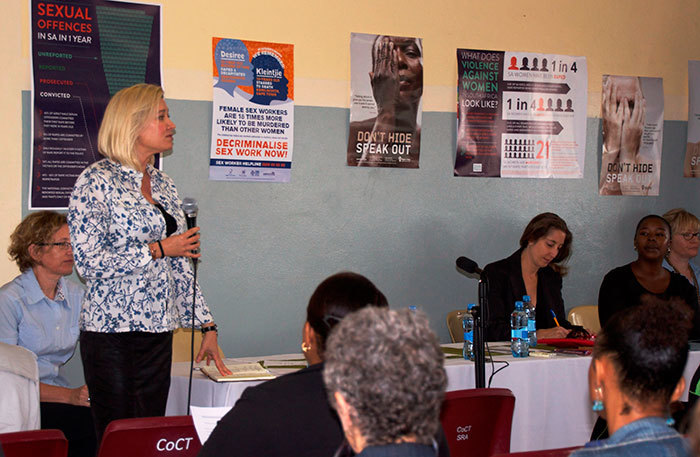Sexual offences summit goes to the heart of community
17 March 2015 | Story by Newsroom
A desire to work with government and other stakeholders to collaboratively improve the status quo was the main thrust of the recent three-day civil society led summit on sexual offences, held in a community centre in Delft.
Organised by the Gender Health and Justice Research Unit (GHJRU), and the University of the Western Cape's Centre for Disability Law and Policy, this community based dialogue attracted over 150 participants each day. Based in UCT's Faculty of Health Sciences, the GHJRU promotes evidence-based advocacy for legal, policy and programmatic reform.
Speakers and participants provided written and oral submissions on a number of issues, including legal accountability, the review of sexual offences case law, budgeting for the implementation of the Sexual Offences Act, parliamentary oversight of state departments rendering services to victims, sexual violence in schools, and medico-legal and clinical responses to rape.
The extent and impact of sexual offences against prisoners, people with disabilities, children, refugees, asylum seekers and the LGBTI community also came under the spotlight.
"The consistently high numbers of participants and the constructive level of dialogue between community members, NGOs and government representatives during the summit was unexpected and truly remarkable," said GHJRU director, Professor Lillian Artz.
"We had hoped to develop a process that recognises civil society as both transformative and relevant to the process of ensuring access to justice for rape survivors. Given the deep level of community/state engagement, not to mention the pragmatic approach to law reform and improved service delivery submitted by the speakers and community members, I believe we achieved our objective," she said.
Government accountability
Artz added that the aim was to promote accountability in government, particularly where it has committed itself, through law, to ensuring fair, equitable and speedy access to justice for victims of rape and other sexual offences.
Community members, NGOs, representatives from the state criminal justice system, social development and health departments as well as researchers, experts and practitioners in the field of sexual offences were well-represented.
GHJRU senior researcher and summit co-ordinator, Hayley Galgut, said that it provided a much-needed space for constructive dialogue and reflection.
"It also highlighted the local community's poignant sense of alienation in relation to policy and resource allocation decisions, which directly affect their lives, as well as their desire to be heard and to work collaboratively with government and other relevant stakeholders to improve the status quo."
One community member thanked the organisers for not bussing participants into town to a "five- star hotel away from our families and commitments".
"You brought the debate here and gave us the opportunity to speak on our own terms, right in the centre of our own community, where it happens."
Director of UCT's Safety and Violence Initiative, Guy Lamb, agreed.
"The GHJRU needs to be commended for taking socially responsive scholarship to the next level by holding the event in an epicentre of sexual violence and presenting knowledge and analysis [of sexual offences] in a respectful and empowering manner," Lamb said.
A report on the written and oral submissions by speakers and participants at the summit will be published. The GHJRU will disseminate the findings to relevant government departments and parliamentary committees as well as to national human rights institutions and oversight bodies.
Interest in the summit's methodology and outcomes has also been expressed by the GHJRU's regional partners in Central and East Africa.
 This work is licensed under a Creative Commons Attribution-NoDerivatives 4.0 International License.
This work is licensed under a Creative Commons Attribution-NoDerivatives 4.0 International License.
Please view the republishing articles page for more information.










